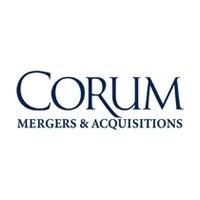Peoplesafe Acquires Trusty Ox Systems
Barry Larson, founder and CEO of Trusty Ox Systems, a Canadian company focused on providing employee safety monitoring solutions, found himself having to address a crucial question regarding the future of his company. After ten years in business, Trusty Ox needed additional funding to grow. However, the company's target market ‒ safety and compliance ‒ was undergoing consolidation, something that forced Larson to consider various possibilities. He could fund the growth with his own money. He could raise money from investors. Or he could sell the company. Having previously founded startups, Larson had experienced the negative impacts of running a business in a consolidating market. With that history to guide him, Larson decided to sell the company. And with Corum as an advisor, he was able to successfully sell Trusty Ox in October 2023 to Peoplesafe, a U.K.-based company that provides devices and services that protect lone workers.
Trusty Ox's flagship solution, Ok Alone, was particularly attractive to Peoplesafe, strategically fitting into their personal safety solution set and their future plans. The product is a low cost safety monitoring solution that gives workers multiple ways to request help, check in, or alert supervisors in high risk situations. Even if an employee is on the road and unconscious, Ok Alone sees that they get help in a timely manner, something that ensures the employee's safety, but also fulfills their employer's duty of care.
In addition to offering Ok Alone, Trusty Ox provides services that improve business operations through automatic data capture and real-time reporting based on that data.
Larson chose Corum as an M&A advisor for a number of reasons. "They had experience in selling in niche sectors like mine," he said. “So that was appealing to me. I also liked the fact that they had a clear process that would get me in front of as many buyers as possible and get the best deal outcome possible.” In fact, Larson expected interest from perhaps 20-to-30 potential buyers. But he said, "Corum opened up my eyes to realize that there were a hundred organizations out there who might be interested in us."
In addition, Larson pointed to Corum’s research team as an important asset in achieving an optimal result. “Their research team,” he said “is on top of what buyers want. They're not only digging through databases and doing Google searches, but they’re continually talking to the Corum sales staff about what buyers are telling them.” Larson also liked the fact that Corum assigned a team to his account. “It wasn't just an individual sales handler, “he recalled. “There were always at least two Corum people involved with the process. This meant that if there was a personnel change, or if we wanted a different opinion on a problem we were having, there was always another fresh set of eyes to help us out."
A major advantage in working with an experienced investment banker such as Corum is that it allows a CEO to maintain focus on their business. Larson noted, "My focus throughout all of this was to maintain my eye on the business and the business results, which is the key reason I hired Corum. I let them do all the marketing, arranging meetings, and that kind of thing. When we got to the presentation stage I did the presentations. But it really left me free to just focus on doing the business every day. There were a couple of periods during due diligence where my time and energy were shifted, but otherwise I'd stick to the day job pretty much. And that's really important because you don’t want to get halfway through the sales process and suddenly the business performance starts to fall off.”
Asked what advice he would give CEOs who are considering an M&A, Larson stressed the importance of putting yourself in the buyer’s shoes. He put it this way: "Think of the buyer as another customer. Think about all the things you would want to know if you were the buyer, and then start designing your data, your reporting, your systems, and all of that to address those types of questions."
Larson also underscored the importance of being committed to the sale and for the right reasons. He noted, "I've seen other people walk into it with the thought of, 'Well, I would sell, but only if I got so much money.' That's not really helpful. It's not fair to try to dump it on your broker or whoever you’re working with to get you this number. There's a ton of work that has to go in advance. You need to be committed all the way and then see it through to the end."
Larson added that being committed also means accepting the fact that you no longer will be the person in charge after the sale, "It's not going to be your business anymore," he said. "And just coming to that realization and being comfortable with it can be difficult. There are all sorts of changes that happen. But you finally need to say goodbye."
Successfully selling his business has given Larson time to do things he had to put off because of the demands of running a company. "Now I can take time to look at opportunities in a different way," he acknowledged. "I'm really quite enjoying that. This applies to personal projects such as going back to the university. It also applies to community ventures that I want to get involved with."
And with that luxury of time, Larson can look for the next thing that interests his entrepreneurial spirit. He pointed out, "There are all sorts of exciting projects happening through the economy. I'm just casting my line out there, seeing what excites me, and what might catch me."
